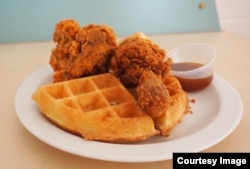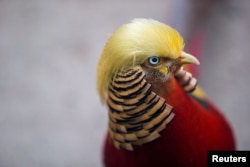Why Did We Call Cows Beef
At present, Words and Their Stories from VOA Learning English.
On this program we often talk about the origins of words and expressions that we employ in American English. We besides talk about how we use them in everyday conversations.
Today we talk about animals--and animals nosotros eat. In English, these two categories ofttimes have dissimilar names. Pigs turn into pork. Cows plow into beefiness. Sheep is mutton. Calves are veal. And deer is venison.
Just why do we call these animals unlike names when we prepare them for a meal? Why is it "hog" on the farm but "pork" in a sandwich?
The answer is the Norman Conquest of Britain in 1066. That is when many French words became part of the English language. Many of those French words related to the battlefield, such as "regular army" and "royal." Many related to government and revenue enhancement.
And many others related to nutrient.
When animals were in the stable or on the farm, they kept their Old English language names: sus scrofa, cow, sheep and calf. But when they were cooked and brought to the table, an English version of the French word was used: pork (porc), beef (beouf), mutton (mouton) and veal (veau).
On several websites, word experts claim that this change shows a class deviation between the Anglo-Saxons and the French in Britain at the fourth dimension of the conquest.
Because the lower-class Anglo-Saxons were the hunters, they used the Former English names for animals. Merely the upper-course French saw these animals merely at mealtimes. Then, they used the French word to describe the prepared dishes. Today, modernistic English language speakers — regardless of social course — have come up to use both.
However, the words "deer" and "venison," however, are a bit more complicated.
Etymology Online says "venison" comes from an Onetime French word from the 1300s (venesoun) pregnant "'meat of large game,' especially deer or boar." And that Onetime French discussion comes from a Latin give-and-take (venation) meaning "a hunt, hunting, or the chase."
Post-obit the Norman Conquest of 1066, any hunted beast was called venison subsequently it was killed. And probably because deer were killed more than any other animal, "venison" came to mean "deer meat."
However, "craven" and "fish" remain largely unchanged.
Nonetheless, sometimes we apply the word "poultry" when talking well-nigh buying a chicken, turkey, or other similar bird to eat. For example, a grocery store may have a place called "the poultry section."
But nosotros don't apply "poultry" when nosotros order chicken or turkey at a eating house, or serve it at a repast. Nosotros only say "chicken" or "turkey."
For instance, if I want to order my favorite dish, which is popular in the southern part of the The states, I will say, "I'll have the chicken and waffles, delight." I would never guild "poultry and waffles."
Lesser mutual birds, such every bit quail and pheasant, simply go by their ain names.
What about fish?
The French discussion for "fish" is "poisson." Some word experts suspect that "poisson" is also shut to the English word "poisonous substance" to become a mutual food word.
After all, even the food-rich culture of France cannot overcome the fact that eating toxicant might kill you or at to the lowest degree make yous sick. Equally a effect, anything that even sounds like "toxicant" volition probably be an unpopular pick at mealtimes.
And that bring us to the terminate of some other Words and Their Stories.
In your linguistic communication, do the words for animals change when you eat them? Let us know in the Comments Section!
Thanks for joining us. I'm Anna Matteo.
I'm William the Conqueror U.k.'southward beginning Norman king. I found renown and won my crown at the Battle of Hastings.In September of 1066 …"
Anna Matteo wrote this story for VOA Learning English. Kelly Jean Kelly edited the story.
______________________________________________________________
Words in This Story
category – northward. a group of people or things that are similar in some way
Norman Conquest – This major event in history is when William, duke of Normandy, took control of England. His important victory at the Battle of Hastings (Oct. 14, 1066) resulted in profound political, administrative, and social changes in the British Isles
conquest – n. the act of taking command of a country, city, etc., through the utilise of force
royal – adj. of, relating to, or field of study to the crown
stable – n. a building in which animals are kept, fed, and cared for
poultry – n. birds (such as chickens and ducks) that are raised on farms for their eggs or meat
quail – n. an Old World migratory game bird : a kind of modest wild bird that is frequently hunted
pheasant – n. a large bird that has a long tail and is often hunted for food or sport
overcome – v. to defeat (someone or something) : to successfully deal with or gain control of (something difficult)
Source: https://learningenglish.voanews.com/a/words-and-their-stories-pig-or-pork-cow-or-beef/4104856.html



Postar um comentário for "Why Did We Call Cows Beef"